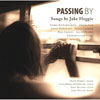Heggie Passing By
Jake Heggie’s songs beautifully realised by a fine group of singers
View record and artist detailsRecord and Artist Details
Genre:
Vocal
Label: Avie
Magazine Review Date: 13/2010
Media Format: CD or Download
Media Runtime: 0
Mastering:
Stereo
Catalogue Number: AV2198

Author: Edward Seckerson
I can do scant justice to this collection in the space permitted but suffice it to say that these songs “sing” most ardently. Heggie is not afraid to acknowledge, indeed embrace, America’s Broadway heritage in the way his tunes “hook” us – be it in an isolated phrase or a longer line – but he displays at all times a really composerly instinct in the way these songs are structured. The two sets of duets, for instance: Facing Forward/Looking Back and Here and Gone. The former examines that most special relationship of mother and child, or to be more precise mother and daughter, through the harmonic tensions and equivocations of two-part counterpoint where consonance is always a whisker away from dissonance or in one instance – the Armistead Maupin setting “Mother in the mirror” – downright abrasiveness. One of these settings, “Let it go”, is of Heggie’s own words – an imagined conversation with his father who committed suicide when Heggie was 10. You don’t actually need that information in order for the aching truth of the duet to take hold but it does help to explain how and why the melodic interaction is so special. Frederica von Stade and Joyce DiDonato do it proud.
Paul Groves and Keith Phares do likewise for Here and Gone, poems by AE Housman and Vachel Lindsay which give resonance to the concept of love unrequited only to be acknowledged after it is too late. Every word here finds an apposite musical response, be it the stupendously bitter “Factory Window Song” (so redolent of Owen’s “We walked quite friendly up to Death” from Britten’s War Requiem) or the heartbreaking resignation of “The half-moon westers low”.
Heggie’s setting of Rilke’s “To say before going to sleep” is glorious and solitary, beautifully realised by Joyce DiDonato, who also brings an opera singer’s empathy to Heggie’s musical reimagining of the final monologue from Terrence McNally’s play about Maria Callas, Master Class. How completely Heggie relates to the poignant subtext of this “confessional”. The isolation and unforgiving “hollowness” of the line “Besides, it’s all there in the recordings” says more about Callas’s losses – her one true love and career – than the entire play.
Discover the world's largest classical music catalogue with Presto Music.

Gramophone Digital Club
- Digital Edition
- Digital Archive
- Reviews Database
- Full website access
From £8.75 / month
Subscribe
Gramophone Full Club
- Print Edition
- Digital Edition
- Digital Archive
- Reviews Database
- Full website access
From £11.00 / month
Subscribe
If you are a library, university or other organisation that would be interested in an institutional subscription to Gramophone please click here for further information.




